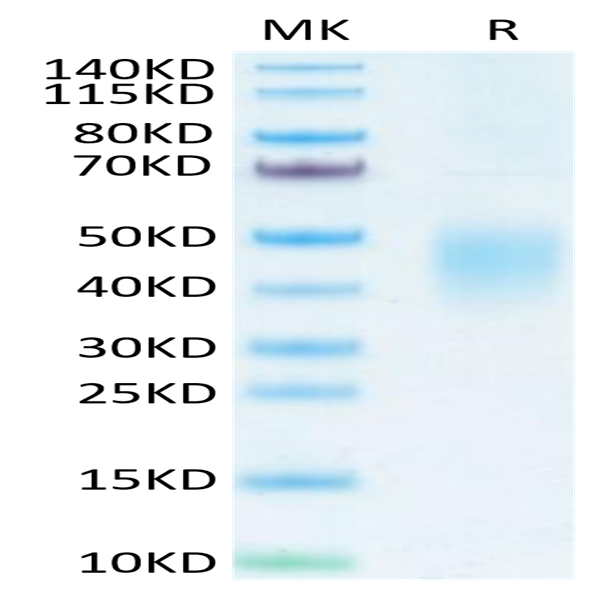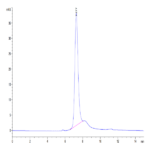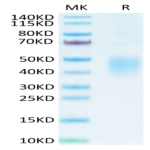Cynomolgus TLR3 Protein (TLR-CM103)
$283.50 – $945.00
KACTUS Biosystems Cynomolgus TLR3 Protein (TLR-CM103) (catalog No. TLR-CM103) is expressed from HEK293 with His tag at the C-Terminus.It contains Ser31-Glu711.
- Details & Specifications
- References
- More Offers
| Catalog No. | TLR-CM103 |
|---|---|
| Product Name | Cynomolgus TLR3 Protein (TLR-CM103) |
| Supplier Name | KACTUS Biosystems |
| Brand Name | KACTUS Biosystems |
| Species | Cynomolgus |
| Source | HEK293 |
| Accession | A0A2K5WT39 |
| Product Tag | C-His |
| Biotinylated | no |
| Exact Sequence | Ser31-Glu711 |
| Molecular Weight | The protein has a predicted MW of 78.04 kDa. Due to glycosylation, the protein migrates to 95-115 kDa based on Tris-Bis PAGE result. |
| Form | Lyophilized |
| Formulation | Lyophilized from 0.22μm filtered solution in PBS (pH 7.4). Normally 8% trehalose is added as protectant before lyophilization. |
| Reconstitution | Centrifuge the tube before opening. Reconstituting to a concentration more than 100 μg/ml is recommended. Dissolve the lyophilized protein in distilled water. |
| Purity | > 95% as determined by Tris-Bis PAGE;> 95% as determined by HPLC |
| Endotoxin | Less than 1EU per μg by the LAL method. |
| Shipping | Shipped at ambient temperature. |
| Stability & Storage | '-20 to -80°C for 12 months as supplied from date of receipt.;-20 to -80°C for 3-6 months in unopened state after reconstitution.;2-8°C for 2-7 days after reconstitution.;Recommend to aliquot the protein into smaller quantities for optimal storage. Please minimize freeze-thaw cycles. |
| Note | Products will be shipped from the warehouse in Massachusetts. Promotion is running from time to time. Welcome to send a request for quote to message@sydlabs.com. |
| Order Offline | Syd Labs, Inc. 4 Avenue E, Hopkinton, MA 01748 USA. Phone: 1-617-401-8149 Fax: 1-617-606-5019 Email: message@sydlabs.com |
Description
TLR-CM103: Cynomolgus TLR3 Protein (TLR-CM103)
TLR3 is expressed in the central nervous system (CNS), where it is required to control HSV-1, which spreads from the epithelium to the CNS via cranial nerves. TLR3 is also expressed in epithelial and dendritic cells, which apparently use TLR3-independent pathways to prevent further dissemination of HSV-1 and to provide resistance to other pathogens in TLR3-deficient patients. Human TLR3 appears to be redundant in host defense to most microbes but is vital for natural immunity to HSV-1 in the CNS, which suggests that neurotropic viruses have contributed to the evolutionary maintenance of TLR3.
Please remember our product information: Cynomolgus TLR3 Protein (TLR-CM103) catalog number: TLR-CM103 KACTUS Biosystems





